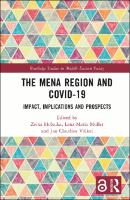The MENA Region and COVID-19
Proposal review
Impact, Implications and Prospects
Contributor(s)
Hobaika, Zeina (editor)
Möller, Lena-Maria (editor)
Völkel, Jan Claudius (editor)
Language
EnglishAbstract
Focusing on the Middle East and North Africa (MENA) region, which comprises some of the world’s richest countries next to some of the poorest, this book offers excellent insights into the discriminatory consequences of the COVID-19 pandemic. With a geographic focus on the MENA region, the multidisciplinary case studies collected in this edited volume reveal that the coronavirus’s impact patterns are a question of two variables: governance performance and socioeconomic potency. Given the global, unprecedented, complex, and systemic nature of COVID-19 – and its long-term implications for societies, governments, international organisations, citizens and corporations – this volume entails a relevance to regions undergoing similar dynamics. Analyses in the book, therefore, have implications for the comparative study of the pandemic and its impact on societies around the globe. Understanding related dynamics and implications, and making use of lessons learned, are a pathway to deal with future similar crises. Questions covered in the volume are relevant to geopolitics, social implications and the relations between political leaders and citizens as beings embedded in various strategies of communication. The volume will appeal to scholars of international politics, political science, risk or crisis governance, economics and sociology, human rights and security, political communication and public health.


 Download
Download